 Petzlover
Petzlover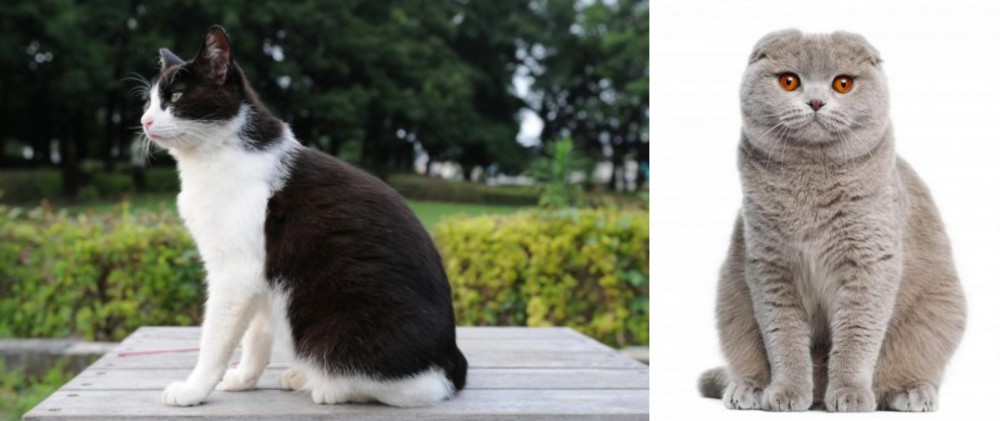 Bicolor is originated from United States but Scottish Fold is originated from United Kingdom. Both Bicolor and Scottish Fold are having almost same weight. Bicolor may live 3 years more than Scottish Fold. Both Bicolor and Scottish Fold has same litter size. Bicolor requires Moderate Maintenance. But Scottish Fold requires Low Maintenance
Bicolor is originated from United States but Scottish Fold is originated from United Kingdom. Both Bicolor and Scottish Fold are having almost same weight. Bicolor may live 3 years more than Scottish Fold. Both Bicolor and Scottish Fold has same litter size. Bicolor requires Moderate Maintenance. But Scottish Fold requires Low Maintenance
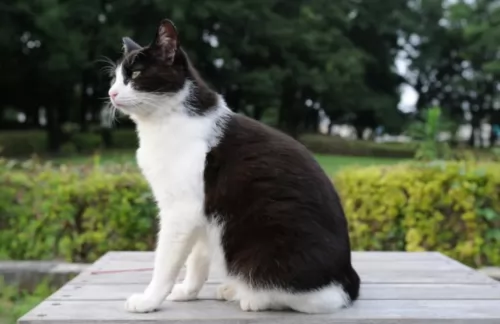 The first thing to know is that a Bicolor cat isn’t in fact a breed. Bicolor is just a term that describes a certain look that a cat has with its coat. It’s a cat with two colors such as red and white or black and white.
The first thing to know is that a Bicolor cat isn’t in fact a breed. Bicolor is just a term that describes a certain look that a cat has with its coat. It’s a cat with two colors such as red and white or black and white.
A popular name for bi-color cats is also Piebald or Tuxedo, and in fact many cat breeds can produce bicolor kittens, or black and white kittens such as Cornish Rex, Maine Coon, Manx, and others.
There are different coat color combinations when it comes to bicolor cats and the black and white markings may be more common but there are other color combinations too such as orange and white.
Nobody seems to know the origins of the Bicolor cats so we are going to assume they come from the USA.
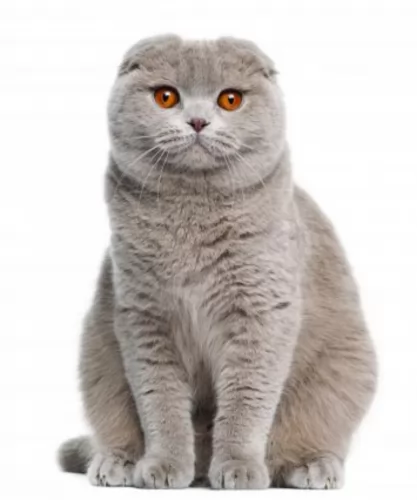 The Scottish Fold is a domestic cat that has an owlish look to it. This is because of the natural dominant-gene mutation that affects cartilage in the cat.
The Scottish Fold is a domestic cat that has an owlish look to it. This is because of the natural dominant-gene mutation that affects cartilage in the cat.
The ears of the Scottish Fold cat folds in a weird way so that the cat has an owl-like look to it. These cats are also known as Highland Fold and Coupari.
It seems that the first Scottish Fold was a white barn cat with the name of Susie. When Susie had kittens, there were a couple of them born with these folded ears. A cat fancier registered the breed in the United Kingdom and in 1966 started a breeding program. These cats were later exported to America.
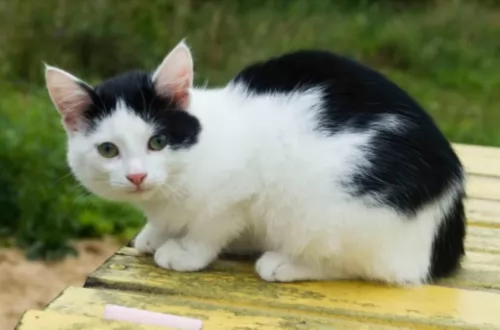 Regardless of the breed they belong to, information on these cats suggests that they can have many different looks. Look at the amazing Turkish Van cat for instance – each of these cats is recognizable for its long, luxurious fur. You’ll find a few touches of color on the cat's ears and tail, making in a Bicolor. They also have an interesting characteristic – being fond of water!
Regardless of the breed they belong to, information on these cats suggests that they can have many different looks. Look at the amazing Turkish Van cat for instance – each of these cats is recognizable for its long, luxurious fur. You’ll find a few touches of color on the cat's ears and tail, making in a Bicolor. They also have an interesting characteristic – being fond of water!
These Bicolor cats weigh in the region of 3 – 7kg, and can tend towards the smaller or larger size. Some of them can have short or long hair, larger or smaller ears and green or yellow eyes.
Coming from different cat breeds, the bicolor cat can have a mix of wonderful characteristics – they can be vocal or quiet or confident or shy.
They’re always wonderful though and can be curious, intelligent, playful, loving and loyal. They make great companions who just love the interaction they have with their human owners.
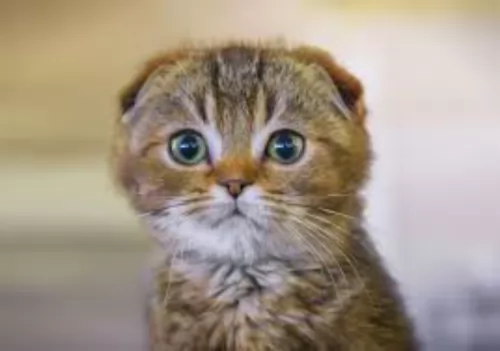 This is a medium-sized cat that weighs between 3 and 6kg. The entire body of this cat is of a rounded nature. The legs are also fairly short.
This is a medium-sized cat that weighs between 3 and 6kg. The entire body of this cat is of a rounded nature. The legs are also fairly short.
All Scottish Fold kittens are born with regular ears but within the first few weeks after birth, the peculiarity with the ears starts to come in. However, some kittens don’t develop folded ears.
The first cats had one fold but with selective breeding, some have 2 or 3 folds or creases so that the ears lie flat against the head. The cat has a round head and large, round eyes. These cats can have a long- or short coat which is thick and soft and the coat can be in a number of colors.
Your Scottish Fold is a good-natured, placid cat and adapts well to different homes and lifestyles. He gets on well with children and pets, becoming just a little bit more attached to the one who feeds him.
He ‘talks’ with quiet meows and purs. They’re playful cats and love to spend time outdoors. A climbing tree and stimulating toys will be a good idea for this energetic feline as he is active and curious. He won’t like being left for long periods though.
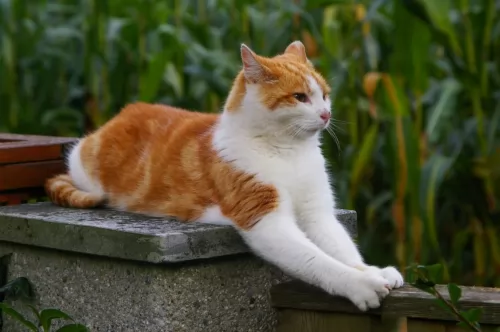 The Bicolor cat is such a steady, reliable cat-friend to have. When you start looking as these cats as your companion, you're going to get a smart, funny, adoring, playful family member who will be there for you whether you go to work each day or stay at home.
The Bicolor cat is such a steady, reliable cat-friend to have. When you start looking as these cats as your companion, you're going to get a smart, funny, adoring, playful family member who will be there for you whether you go to work each day or stay at home.
They’re such easygoing cats, with no airs and graces. They’re happy, relaxed, and uncomplicated cats and when you make a Bicolor your pet and friend, your life just becomes that much more meaningful.
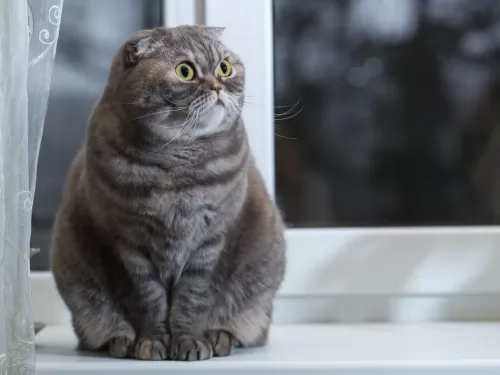 With his big, round eyes, the Scottish Fold has an amicable looking face and he is a friendly calm cat.
With his big, round eyes, the Scottish Fold has an amicable looking face and he is a friendly calm cat.
They love attention and get on well with children and pets who have been trained to be gentle around cats. It is also quite a vocal breed although he 'talks' in a quiet voice.
Because they thrive on pampering and attention, it is better for this cat not to be in a home where the owners are away at work all day.
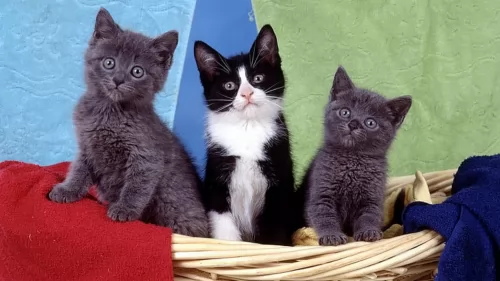 By providing your kitty cat with a loving home, you can ensure that he stays as healthy as possible. Unfortunately though, cats can get sick, regardless of how well you take care of them and then as a responsible pet owner, you will be able to take your pet to your local vet.
By providing your kitty cat with a loving home, you can ensure that he stays as healthy as possible. Unfortunately though, cats can get sick, regardless of how well you take care of them and then as a responsible pet owner, you will be able to take your pet to your local vet.
Some of the common cat problems you get can be kidney disease, ear infections, dental disease, parasites such as heartworm, cancer or something like feline immunodeficiency virus.
Whether your cat has a virus or an infection, remember that getting your cat to the vet can mean nipping the problem in the bud before it gets more serious.
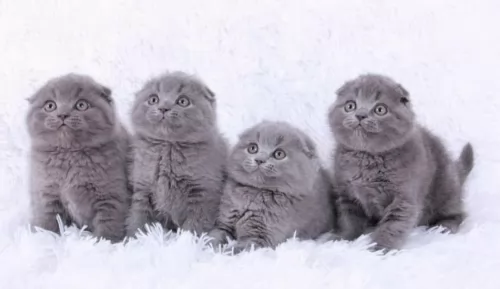 Perhaps one of the things to look out for with these cats is a disease known as osteochondrodysplasia.
Perhaps one of the things to look out for with these cats is a disease known as osteochondrodysplasia.
This is a hereditary disorder of the bones and cartilage. The disease is caused by an autosomal dominant trait and a cat can inherit just one copy of the abnormal gene to have the disease.
Having this disease comes with other health issues and a cat with this disease will be reluctant to jump and may even become lame.
Whenever you suspect anything wrong with your Scottish Fold cat, get him to the vet just as soon as possible.
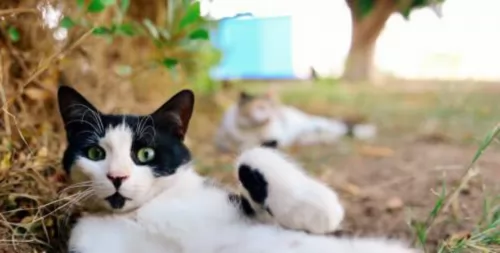 Caring for your Bicolor cat is much the same as with any other cat. Your Bicolor will shed, so brushing him will tickle him pink, especially if you do it lovingly and gently – it’s like a bonding session. The weekly brushing will get rid of loose hairs and dust and keep the coat healthy and shiny.
Caring for your Bicolor cat is much the same as with any other cat. Your Bicolor will shed, so brushing him will tickle him pink, especially if you do it lovingly and gently – it’s like a bonding session. The weekly brushing will get rid of loose hairs and dust and keep the coat healthy and shiny.
Spay or neuter your pet to avoid unwanted kittens. Stay up to date on veterinary visits and vaccinations.
Provide your cat with stimulating toys as well as all the equipment he needs to be comfortable – food and water bowls, litter box, grooming equipment, bedding, climbing- and scratching equipment.
All cat owners, whether their cats eat homemade food or wet- or dry food should read cat food labels and understand the nutrients content.
Certainly, as a carnivore, cats require certain vitamins, minerals, and proteins that only meat can provide.
Understand how to work out if the cat food is balanced or not and not packed with too many grains and carbohydrates.
How much your Bicolor eats will depend on his age and his activity levels. Be careful not to overfeed your cat as overfeeding is dangerous. When cats put on too much weight, it leads to problems such as diabetes, heart- and joint disease.
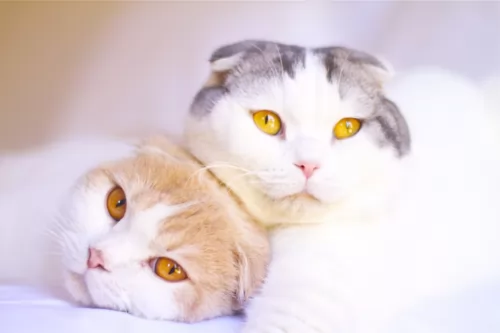 Scottish folds have thick fur and you should at least brush it once a week to get rid of dust and loose hair.
Scottish folds have thick fur and you should at least brush it once a week to get rid of dust and loose hair.
Keep your cat’s nails trimmed otherwise you could get a nasty scratch.
Provide your cat with a climbing tree as well as a scratching post as these are two things – climbing and scratching – that are in the nature of cats.
Provide your Scottish Fold with a litter box and make sure that it is kept clean and that you remove the feces every single day.
Provide your pet with stimulating toys as they are active, intelligent cats.
Protect your cat from fatal cat diseases by having him vaccinated. Your vet will inform you about which vaccines are best. Kittens need vaccines when they are between 6 to 8 weeks old These vaccines come in a series but you don’t have to stress, as the vet will give you a card with the date on which your kitten must return for his next vaccine.
Your Scottish Fold needs to receive the highest quality cat food there is as these foods are balanced with the right amount of vitamins and minerals. When it comes to commercial cat foods, you’ve got choices. You can choose wet or dry food or even combination – something to tempt the fussiest of cats. Cats are carnivores and their food needs to be almost entirely of meat.